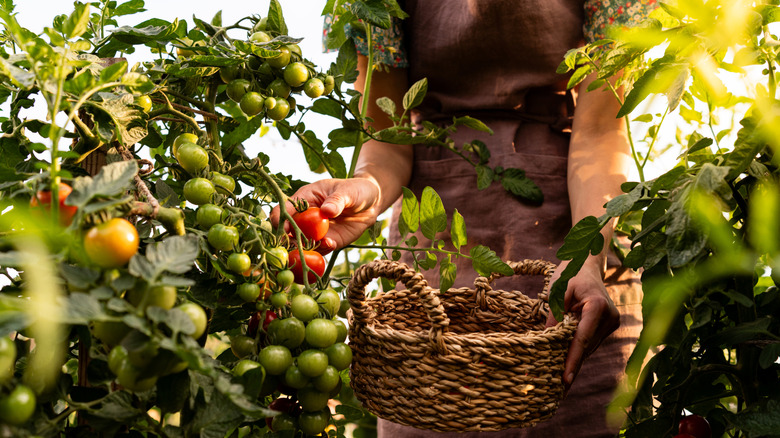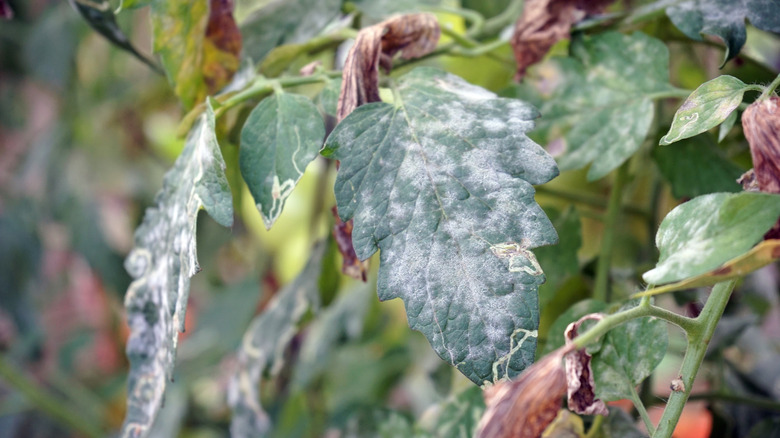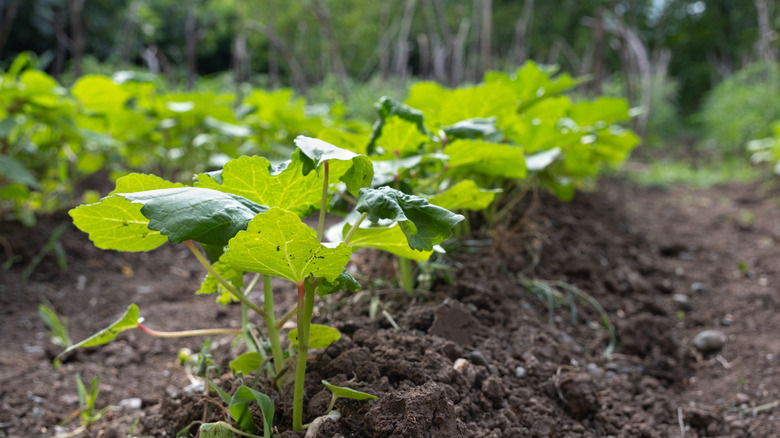The Plant You Should Avoid Growing Near Tomatoes
As you map out and space your garden veggie plants, you've probably got a few tomato plants in your plan. The tasty and versatile veggie is a popular choice for many gardeners. If you want to make your gardening life easier, though, make sure you keep those tomatoes far away from any okra you're hoping to plant. Tomatoes and okra are great together in a gumbo or stewed together as a side dish. But out in the garden, they're best kept separate according to Tiffany Selvey, House Digest's Garden Editor and in-house Master Gardener.
In an exclusive interview, Selvey said the large, fast-growing plants can become more vulnerable to pests and diseases if planted too close together. While any two plants grown too close together can face problems, Selvey explained, "Tomatoes and okra both grow very quickly and have large, dense leaves making them even more prone to these issues if planted too closely." This makes adequate spacing even more important to make sure these larger plants don't crowd each other.
So if you're hoping to grow tasty okra as well as delicious heirloom tomato varieties this season, make sure you understand the risks of planting them near each other. By following a few tips and guidelines for spacing and plant care from the in-house Master Gardener, you can stave off potential pest and disease problems and enjoy a healthy harvest of both veggies.
The disadvantages of growing tomatoes near okra in the garden
Although tomatoes and okra are sun-hungry vegetable plants, an ideal vegetable plot would not keep these two species in the same sunny beds. The reason, according to Tiffany Selvey, is that the dense foliage of both plants can create the conditions for fungal infestations if planted near each other. "This shady, humid environment is perfect for powdery mildew and other problems," Selvey exclusively told House Digest.
The two veggie plants also have a lot of overlapping pest issues. "Aphids and whiteflies are particularly fond of these plants, as are flea beetles" Selvey explained. "Growing these crops closely together will likely result in multiple infestations and make them harder to control." Pests that come for the okra are liable to move on to the tomatoes and vice versa.
But the biggest issue with planting tomatoes and okra near each other is resource competition. According to Selvey, "Both of these crops are heavy feeders – they need consistently nutrient-dense soil and sufficient water to thrive. Since they are both so demanding, they will compete for resources, weakening one or both of the crops." Not only can that impact your harvest and the health of your plants, it can also exacerbate the pest and disease issues mentioned earlier. "Weak plants are more prone to pests and disease," Selvey said.
Tips for growing tomatoes and okra in your garden
For gardeners with ample space to work with, the best approach is to grow your okra and tomatoes in separate beds. But if you have limited room, growing them both in the same bed is doable. In the exclusive House Digest interview, Tiffany Selvey said, "As long as you have sufficiently fertile soil and are prepared to deal with pest issues if they arise, you can plant okra and tomatoes near each other if you have a small garden."
It's still important to plant your tomato rows as far from your okra rows as possible, though. Even within rows of the same plants, make sure you're not overcrowding. If spacing recommendations aren't listed on the packaging, check the mature width of the specific varieties you're growing and space them so that plants will still have air flow between them when they reach that size. "Correct spacing between plants is vital for preventing fungal issues," Selvey said.
While proper spacing can minimize the risk of disease, gardeners need to be vigilant during the growing season to control pests. "At the first sign of aphids or whiteflies, spray them off with the jet setting on a hose-end sprayer to knock them off. Be sure to get the undersides of the leaves, too," Selvey recommended. "You'll have to repeat this process every few days for a week or so, but that usually takes care of them without pesticides."


